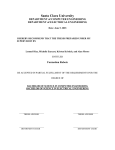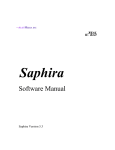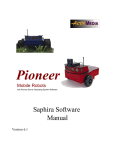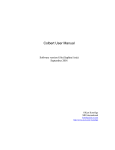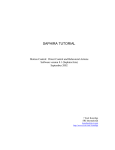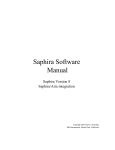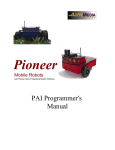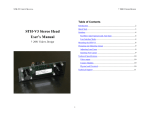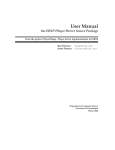Download Getting started with smallv - Riccardo Cassinis` home page
Transcript
SAPHIRA TUTORIAL Compiling, Loading and Debugging C++ Files: Unix Systems Software version 8.0 (Saphira/Aria) September 2001 Kurt Konolige SRI International [email protected] http://www.ai.sri.com/~konolige Saphira Tutorial on Loadable Files 2 1 Introduction ______________________________________________________ 3 2 Shared Object Files under UNIX _____________________________________ 4 2.1 Compiling and Linking C/C++ Source Files ______________________________ 4 2.2 Writing C or C++ Client Programs _____________________________________ 4 3 Compiling and Linking Client Programs under UNIX ____________________ 7 3.1 Loading Shared Objects into a Saphira Client ____________________________ 8 3.2 Initializations on Loading _____________________________________________ 8 4 Debugging C Code under UNIX ______________________________________ 9 4.1 Setting a Breakpoint__________________________________________________ 9 4.2 Debugging from a Breakpoint __________________________________________ 9 Saphira Tutorial on Loadable Files 3 1 Introduction This tutorial introduces loadable object files as a means of extending the functionality of Saphira. A simple example of such a file, compiled from C++ code, is given. The source and makefile for the sample object file can be found in the Saphira/tutor/loadable directory. Saphira Tutorial on Loadable Files 4 2 Shared Object Files under UNIX Most UNIX systems allow object files to be dynamically loaded into a running program, using the dl functions (dlopen, dlsym, dlclose). Object files can be compiled from any source, but usually come from C or C++ programs. A special linking operation on these object files creates shareable object files, which contain information that allows them to be loaded into an executing program. Typically they will have the suffix .so. Saphira takes advantage of the dynamic load facility under UNIX. Users can write C/C++ programs that are then compiled into shared object files.. These object files can be loaded into a running Saphira client, and the functions in them made available through the Colbert interface. In this way, the user can extend Saphira with new functions written in C/C++. As of Saphira 8.x, the Saphira library is written as a set of classes in C++, and is built on top of the Aria system from ActivMedia Robotics. User programs access basic Saphira and Aria services through these classes. User programs can also be written a mixture of C and C++, using standard interfacing between the languages. Because of limitations in the syntax and semantics of Colbert, it is not possible to express interfaces to C++ objects or their member functions directly. Instead, users must write C or C++ global functions accessing the C++ objects, and then make these functions available for calling from Colbert. The objects themselves can be passed around as NULL pointers within C programs and Colbert. 2.1 Compiling and Linking C/C++ Source Files To compile a loadable shared object file, you must have installed the Saphira and Aria distributions according to the directions in the readme file. In particular, the environment variables SAPHIRA and ARIA must be set to the top levels of their respective distributions. In addition, Saphira and Aria distributions should be set up as subdirectories of a common directory. After installing the Saphira distribution, follow these steps to create a client or a shared object file: 1. 2. 3. Write a C/C++ program containing your code, including calls to Saphira library functions. Compile the program to produce an object file. Link the object file together with the relevant Saphira library to create an executable or shared object file. In Saphira 8.x, all the Saphira library routines are contained in a shared library. In UNIX systems, it is the shared library libsf.so. Aria routines are also accessed through a shared library, libAria.so. 2.2 Writing C or C++ Client Programs To load new C/C++ routines into Colbert, you write one or more C/C++ programs that contain your own functions, and make calls to the Saphira library routines. It may help to review Chapter 2 of the Saphira manual for an explanation of micro-tasks and asynchronous user routines. Note that there are very few remaining Saphira functions that are C functions, and all Aria functions are written in C++. So user programs will generally have at least on C++ file to access the Saphira/Aria libraries. Figure 2-1 and Figure 2-2 show the C++ source code for the sample tutor/loadable/testload.cpp example. The header file Saphira.h must be included at the beginning of the source file. The rest of the file contains C++ and C function and variable definitions. The sfLoadInit function is called after loading the file, and it typically makes the objects in the file available to the Colbert evaluator, through use of sfAddEvalXXX function calls. For information on the effect of these calls, see the Colbert User’s Manual. The sfLoadExit function is called when the file is unloaded, and typically cleans up by getting rid of micro-tasks that are invoked by the file, etc. These functions have the keyword SFEXPORT as part of their definition. For UNIX, this keyword is defined as the empty string, and doesn’t affect the compilation or loading process. It’s necessary under MS Windows, however, and it’s good practice to include it so that your code will compile and run under either OS. 5 Saphira Tutorial on Loadable Files #include "Saphira.h" // global integer variables // on some systems, these will not be initialized on load... int nopen = 0; int globalvar = 1; // string variable char buf[80]; char *mystring; string ptr // we need to set aside space explicitly for a // // C++ global functions // Set up functions to create and manipulate a point artifact // This point will draw on the screen // SfPoint *mypoint; int // sets up a point artifact myfn(int a) { sfMessage("Argument to myfn is: %d",a); mypoint = new SfPoint(a,0,0); return a+2; } void // prints values of a point artifact showpoint(void *p) { SfPoint *pt = (SfPoint *)p; sfMessage("Point x: %d y: %d th: %d", (int)pt->p.getX(), (int)pt->p.getY(), (int)pt->p.getTh()); } void // sets the X and Y values of a point setpoint(void *p, int x, int y) { SfPoint *pt = (SfPoint *)p; pt->p.setX((double)x); pt->p.setY((double)y); sfMessage("Point x: %d y: %d th: %d", (int)pt->p.getX(), (int)pt->p.getY(), (int)pt->p.getTh()); } Figure 2-1 Listing of the testload.cpp program (part one of two). Saphira Tutorial on Loadable Files 6 // // C++ global functions // Set up an interface to the sonar buffers // int get_sonar_dist(int begang, int endang, int *retang) { SfSonarDevice *sd = Sf::sonar(); // get the device if (!sd) return 100000; // large value, no return double ret; ArPose rpose = SfROBOT->getPose(); // Aria occupancy function on the sonar current reading buffer double fdist = sd->getCurrent()->getClosestPolar((double)begang, (double)endang, rpose, 100000, &ret); if (retang) *retang = (int)ret; return (int)fdist; } // // sfLoadInit and sfLoadExit must be declared as exported fns // under MS Windows // SFEXPORT void sfLoadInit(void) // this function is evaluated when the object file is loaded { sfMessage("Opened: %d", nopen); // on open, we should get a message printf("Opened!\n"); // let the console know too... // define constants and variables // sfAddEvalConst("sfLEFT", sfINT, 0); sfAddEvalVar("gv", sfINT, (fvalue *)&globalvar); // note indirection in the last argument! sfAddEvalVar("mypoint", sfPTR, (fvalue *)&mypoint); // note indirection in the last argument! mystring = buf; // set up string ptr mystring[0] = 'A'; mystring[1] = 0; sfAddEvalVar("mystring", sfSTRING, (fvalue *)&mystring); // note the indirection in the last argument! // define functions // any C++ global functions will give an error here if overloaded sfAddEvalFn("myfn", (void *)myfn, sfINT, 1, sfINT); sfAddEvalFn("showpoint", (void *)showpoint, sfVOID, 1, sfPTR); sfAddEvalFn("setpoint", (void *)setpoint, sfVOID, 3, sfPTR, sfINT, sfINT); sfAddEvalFn("get_sonar_dist", (void *)get_sonar_dist, sfINT, 3, sfINT, sfINT, sfTypeRef(sfINT)); // last arg is pointer to int } SFEXPORT void sfLoadExit(void) /* this should be evaluated on unload */ { sfMessage("Unloading: %d", nopen); } Figure 2-2 Listing of the testload.cpp program (part two of two). Saphira Tutorial on Loadable Files 7 3 Compiling and Linking Client Programs under UNIX After the client programs are written, they must be compiled with a C or C++ compiler. We recommend the gcc compiler for UNIX systems; all sample programs have been compiled using this compiler. Other C compilers provided with UNIX systems should also work, however. The compiler and linker are typically called using the make facility. The file makefile in the Saphira/tutor/loadable directory is used to make the testload.cpp program. Figure 3-1 shows this makefile. The first part of the makefile defines variables that are useful in compilation and linking. Note that the Saphira and Aria top-level directories have to share a common parent directory. The ohandler/include directory contains header files, and ohandler/lib has the Saphira libraries, and is where compiled shared objects typically are deposited. Next, the file handler/include/os.h is read in. This file determines the operating system type and sets some system library variables appropriately. NOTE: os.h also sets the CONFIG variable to the particular OS of the machine, which is important for handling some of the system routines correctly. One peculiarity of os.h is that it relies on the conditional preprocessing facilities of gnu make(gmake). Not all native makes support this facility. If you get errors during the preprocessing phase of the compilation from os.h, switch to gmake. The makefile produces the file testload.so in the Saphira library directory (${SAPHIRA}/lib). testload.so is a shared object file, which is loadable under Colbert. The C++ source is compiled as usual; make sure the –g flag is present so that debugging symbols are added to the object file. Under some UNIXes, the source must be compiled as position-independent (PIC) in order to create a shared object file. This detail is handled by the PICFLAG variable, set by os.h. Next, the LD command is invoked to create a shared object file with the extension .so. Saphira expects this extension for UNIX shareable objects, and cannot load objects with any other extensions. The most critical part of the linking operation is the inclusion of the SHARED flag. You must include this variable, defined in os.h for each particular OS, in order to create a shared object file. ## ## Makefile for the loadable tutorial ## SRCD = ./ OBJD = ./ INCD = ../../ohandler/include/ BIND = ../../bin/ LIBD = ../../lib/ ARIAD = ../../../Aria/ # check which OS we have include $(INCD)os.h SHELL = /bin/sh INCLUDE = -I$(INCD) -I$(ARIAD)include ############################################################# all: $(LIBD)testload.so touch all $(OBJD)testload.o: $(SRCD)testload.cpp $(CC) $(CFLAGS) -c $(SRCD)testload.cpp $(INCLUDE) -o $(OBJD)testload.o $(LIBD)testload.so: $(OBJD)testload.o $(LD) $(SHARED) -o $(LIBD)testload.so $(OBJD)testload.o Figure 3-1 Makefile for the testload.cpp program. Saphira Tutorial on Loadable Files 3.1 8 Loading Shared Objects into a Saphira Client Shared object files, with extensions ending in .so, can be loaded into a Saphira client using the Colbert interaction window. The loadlib command will attempt to load a shared object file, using the current directory first, and then the default directories, which always include $(SAPHIRA)/lib. To load the example testload.so, use the following command loadlib testload Note that the extension .so isn’t necessary in specifying the file for the loadlib command. The loadlib command, if successful, prints out the name of the file loaded, and then declares whether it found an sfLoadInit function to evaluate. In this case, when sfLoadInit is evaluated it prints the message Opened: 1 using the sfMessage call. Unloading the shared object file can be accomplished with the unload command. Generally, under UNIX systems there’s no need to explicitly unload a file, since re-loading the same file will cause an automatic unload first. The unload command is mainly a convenience for MS Windows systems, where a shared object file cannot be recompiled if it is in use. If there is an error in your shared object code, you can make changes, recompile and relink the code, and then reload it using the load command again. The new function definitions will replace the old ones. One possible problem with this process is that the Saphira client may be invoking some functions of the shared object, usually in a microtask. Reloading does not update function or other pointers into the original loaded object that may exist. The microtask must be exited before the reload operation is performed, since otherwise it will try to execute nonexistent function code, as the original loaded object code is unloaded automatically. One consequence of reloading is that the previous values of any global variables in the shared object file are lost, and the variable is reset to its initialization value. For example, the variable nopen is always initialized to 0 when testload.so is loaded. Even though it is incremented by the call to sfLoadInit, it gets reset to its initialization value whenever testload.so is reloaded, and so never increments above 1. Within the Colbert interaction window, several functions and variables from the shared object file are made available. Evaluating myfn, for example, will set up a new point artifact, and then return its argument plus 2. 3.2 Initializations on Loading There is one peculiarity of shared object files that are dynamically loaded. Unlike other object files, variables which are declared globally initialized may not be initialized when the file is loaded. For example, the following line in the testload.cpp example initialized a global variable: int globalvar = 1; The variable globalvar may not be set to 1 upon loading the resultant shared object file. In fact, under the Linux system it typically is; under MS Windows it isn’t. The only way to initialize variables securely is with the sfLoadInit function. Saphira Tutorial on Loadable Files 9 4 Debugging C Code under UNIX The Colbert interaction window is a handy facility for debugging clients, because you can query the values of variables, start and stop activities, and so on. Often, it may be necessary to invoke a more heavyduty debugging apparatus, especially for complicated C programs. The Gnu debugger gdb can be useful, especially when started in Emacs. Here are a few tips for interacting with the Gnu debugger. To start up, give gdb the name of the client executable (usually saphira). At the debugger prompt, type run to start the client. Before running the program, the Saphira libraries (libsf.so) aren’t loaded, so you can’t set breakpoints in Saphira functions. Similarly, user shared object files aren’t yet present. After the client is running and you have loaded any shared object files into Colbert, you can set breakpoints by interrupting back to the debugger prompt. All of the Saphira library exported functions and variables can be examined, and you can set breakpoints in the library functions. The Saphira library has been compiled with the -g option, so its symbols are available to the debugger. However, not all the source code is not in the distribution, so you may not be able to step through library functions. Figure 4-1 shows typical output from the GDB debugger. GDB is started by giving it the Saphira executable bin/saphira. Next, Saphira itself is started with the run command. At this point, the Saphira client doesn’t even have a window system available, so it prints out messages on the console. First, it finds its home directory (using the SAPHIRA environment variable) and sets up the Colbert directory path from that. Then, it reads the activity file startup.act from the Colbert directory. You can change startup.act to have any initial behavior you want, but the default file loads the windowing system (fltk.so and fltkwin.so), after which messages will print on the Colbert window. The rest of startup.act loads some basic activities for the robot, and then Saphira continues with its main loop, and several threads are spawned. Saphira itself uses one main thread to control its 100 ms main cycle. At this point, in the Saphira client window, testload.so is loaded. The printf statement in sfInitLoad prints the Opened! line on the GDB console. 4.1 Setting a Breakpoint Since our user program is now loaded, we can set a breakpoint. First, the Saphira client is interrupted by pressing Ctrl-C in the GDB window (actually, you need two consecutive Ctrl-C’s in the Emacs GDB window). A breakpoint is inserted at the myfn function. It’s also possible to scout around and check the values of variables, for example, the value of globalvar. A subtle aspect of GDB is how it handles shared libraries and their symbols. In this version of GDB under Linux, shared object file symbols are automatically made available in the debugger. The sharedlibrary command prints info about all shared libraries known by the debugger; here, all of the symbols in these files are loaded. Under some OSes, such as Solaris, the symbols of shared object files are not automatically loaded into GDB when the shared object is dynamically loaded. In this case, you must interrupt the debugger with Ctrl-C, and issue the command sharedlibrary testload.so to make its symbols visible to the debugger. To continue from the break, use the “c” command; sometimes this has to be issued twice to continue, apparently because of GDB’s handling of threads. 4.2 Debugging from a Breakpoint Continuing from the break, the user then evaluates myfn(1000) in the Colbert interaction window. This interrupts the debugger, and now the user can examine the stack, change data values, and so on, debugging this function (Figure 4-2). To find out where the breakpoint function is being called from, issue the command bt (backtrace). This prints out the function call stack, from the most recently called function. [Anything below the call to eval_fexpr is internal to Saphira and the Colbert interpreter, and not particularly useful.] One nice feature of GDB is the ability to step through lines of your code. Under Emacs, a second buffer will open, showing the position of the program counter in your source code. Here, we step through, and GDB prints out each line as it is executed. After the variable mypoint is set to an object pointer, we Saphira Tutorial on Loadable Files 10 [konolige@dill saphira]$ gdb bin/saphira GNU gdb 19991004 Copyright 1998 Free Software Foundation, Inc. … (gdb) run Starting program: /home/konolige/saphira/bin/saphira starting... SAPHIRA directory is /home/konolige/saphira Started basic processes Load directory is /home/konolige/saphira/colbert Loading file /home/konolige/saphira/colbert/startup.act Loading shared object file /home/konolige/saphira/colbert/../lib/fltk.so No initializer Eval to (void) Loading shared object file /home/konolige/saphira/colbert/../lib/fltkwin.so Evaluating sfLoadInit Starting main frame... [New Thread 31076 (manager thread)] [New Thread 31075 (initial thread)] [New Thread 31077] [Switching to Thread 31077] Opened! Program received signal SIGINT, Interrupt. 0x4017cc61 in __libc_nanosleep () from /lib/libc.so.6 (gdb) òQuit (gdb) break myfn Breakpoint 1 at 0x400711cb: file ./testload.cpp, line 52. (gdb) p globalvar $1 = 1 (gdb) p mypoint $2 = (sfPoint *) 0x0 (gdb) c Continuing. [Switching to Thread 31075 (initial thread)] Program received signal SIGINT, Interrupt. 0x4017cc61 in __libc_nanosleep () from /lib/libc.so.6 (gdb) c Continuing. Figure 4-1 Listing from a running GDB debugging session. can look at its value, and check that the object has the correct position (1000,0,0). Variables and objects can also have their values set by GDB commands. 11 Saphira Tutorial on Loadable Files [Switching to Thread 31077] Breakpoint 1, myfn (a=1000) at ./testload.cpp:52 warning: Source file is more recent than executable. 52 { Current language: auto; currently c++ (gdb) bt #0 myfn (a=1000) at ./testload.cpp:52 #1 0x4003c59a in eval_fexpr (e=0x805bd68) at src/control/expr.c:1450 #2 0x40037ea7 in do_eval (e=0x805bd68) at egi.y:829 #3 0x40039d58 in yyparse () at egi.y:2144 #4 0x4003776b in parse_command () at egi.y:510 #5 0x4003437d in run_process (p=0x40064848) at src/basic/process.c:603 #6 0x40034404 in run_all_processes () at src/basic/process.c:629 #7 0x4004846c in update_and_comm () at src/basic/toplevel.c:779 #8 0x400482a6 in sfDoToplevel () at src/basic/toplevel.c:652 #9 0x40047beb in doact (signum=0) at src/basic/toplevel.c:213 #10 0x40047c15 in dotop (a=0x0) at src/basic/toplevel.c:233 #11 0x4007db85 in pthread_start_thread (arg=0xbf7ffe40) at manager.c:241 (gdb) n 53 sfSMessage("Argument to myfn is: %d",a); (gdb) n 81 { p.x = x; p.y = y; p.th = th; type = sfPOINT; } (gdb) n 54 mypoint = new sfPoint(a,0,0); (gdb) n 55 return a+2; (gdb) p mypoint $3 = (sfPoint *) 0x805bde0 (gdb) p *mypoint $4 = {<sfArtifact> = {<sfDrawable> = {visible = 1, color = 0, _vptr. = 0x40058280}, p = {<sfPosition> = {x = 1000, y = 0}, th = 0}, type = 1, id = 0, newflags = -1, static newid = 1}, <No data fields>} (gdb) Figure 4-2 Breakpoint execution from GDB.











